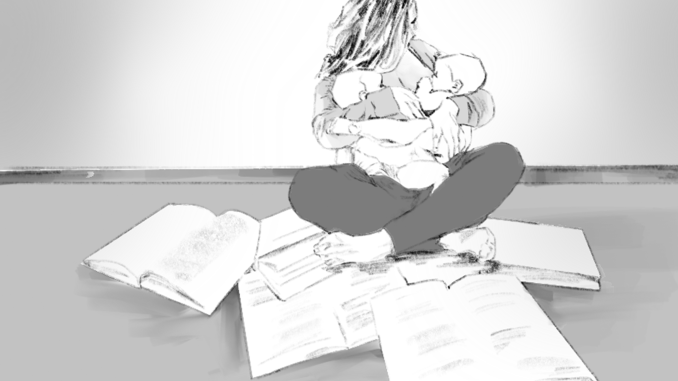
I hadn’t realized how uncomfortable the seats in Ritter Hall were until I returned to classes for the Spring 2022 semester after giving birth during winter break. Trying to focus on my courses as a second-semester graduate student studying counseling psychology, I scooted in my chair to find the most comfortable position.
Had I been home, I would’ve been seated on my sofa or on top of a pillow. That wasn’t an option for me because Temple has no specific policy to support postpartum students. Pregnant students are instructed to communicate with Disability Resources and Services, which provides official accommodation letters for students to give to professors. These letters granted me extensions on assignments and excused absences for mandatory appointments throughout the duration of my pregnancy. I never asked for a single extension, but knowing I had the support of the university made me feel welcome.
That support vanished immediately following childbirth, when I needed it the most. While DRS covers pregnancy, students are transferred to the Title IX office after the child is born.
The Title IX office informed my professors of my due date and stated I would likely need additional assistance. While some professors were supportive, one professor’s response left me livid.
She congratulated me, and followed up with, “I am going to double the number of excused absences from one to two.” The first two classes of the semester were held on Zoom, but she expected me back in the classroom soon thereafter. After two years of adjusting to COVID-19, I was frustrated that she expected me to put my own health at risk to attend in-person classes.
I didn’t fight it, but I should’ve. At the time, I didn’t know I had the right to negotiate, so I took what was offered. To future birthing students, I cannot overemphasize the importance of self-advocacy when talking with the Title IX office and professors.
I returned to in-person classes just over three weeks after childbirth. I took pain medication to sit in rigid classroom seats, wore fitted clothing to hold together my receding abdomen and double-masked so I wouldn’t bring COVID-19 back to my newborn daughter.
I regret not advocating for myself more and suffering through the weeks after childbirth. I was miserable and angry, but I just wanted to push through. In the counseling psychology program where classes are offered only once or twice a school year, a semester off would have delayed my graduation by an entire year.
Higher education is generally behind the curve in providing pregnant students and faculty with humane postpartum accommodations, but some universities value their birthing students with policies and resources that address their needs.
Rutgers University explicitly affirms the Title IX rights of pregnant students, stating academic programs must reschedule all examinations and excuse all absences related to pregnancy and childbirth. The University of Pennsylvania’s Family Resource Center is a centralized location on the college’s campus for resources related to birthing students, like Title IX rights and childcare tips.
Temple offers one Mamava lactation pod for private breastfeeding on Main Campus and a Temple Student-Parent Partnership, wrote Stephanie Ives, associate vice president and dean of students, in an email to The Temple News.
There is only one lactation pod on the ground floor of the Student Center and the partnership is only available for undergraduates, so I couldn’t participate. The university relies largely on students to work with professors, and one lactation pod is not enough.
Temple’s inability to support birthing students pushes away promising talent — particularly women and people of color — as 58 percent of Black student parents drop out of college, according to a March 2021 report by the Institute for Women’s Policy Research. Without a supportive family, I could have been forced to leave Temple in favor of a program that was more flexible. Not every student will have a mother and mother-in-law who can temporarily move in, or a partner who works from home to be a stay-at-home father.
Many university policies are not revolutionary; however, they ensure that birthing students don’t have to choose between their dignity and their academic standing. I chose my academic standing, and I regretted it every day of the semester.
Perhaps my daughter would have found it easier to breastfeed if I’d been home longer. Perhaps my body would have healed better if I hadn’t spent three to six hours a day sitting on hard seats. Perhaps I would’ve emotionally adjusted better to parenthood if I could’ve focused more on my family.
This doesn’t have to be the case for future students. While I maintain that Temple did not support me, I also know I should have advocated for myself.
Temple must create leave policies for birthing students and inform students and professors on those policies. While I had the support system to push through the semester, many won’t, and that doesn’t make them any less worthy of a Temple education.



Be the first to comment